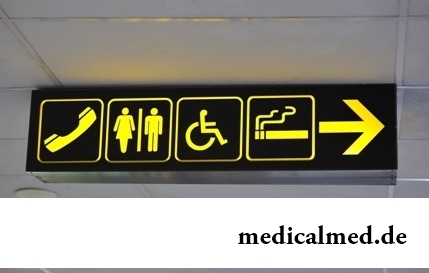





Depersonalization
Depersonalization is the frustration of mentality connected with absence or disturbance of self-perception. The patient  perceives the thoughts, feelings and actions with feeling of observations from outside and alienation. This frustration often is a symptom of a mental disease.
perceives the thoughts, feelings and actions with feeling of observations from outside and alienation. This frustration often is a symptom of a mental disease.
Reasons and symptoms of depersonalization
Depersonalization of the personality is connected with other diseases of mentality and the central nervous system. Panic frustration, depressions, stresses, schizophrenia and bipolar disorders are the most common causes of depersonalization.
The disease can carry, both short-term, and long character. Long and heavy depersonalization can lead to a suicide.
It is possible to carry to the main reasons for depersonalization:
- strong mental shock, stress and depressed case;
- serious mental illness, including psychosis, schizophrenia, maniacal syndrome, etc.;
- neurologic disturbances;
- inborn pathologies of the central nervous system;
- frustration of mentality under the influence of physical injuries.
Depersonalization of the personality can act as the protective mechanism during the emergency situation requiring the bystry solution or action without emotions. In that case the state is temporary and is not pathology.
Biochemical and neurologic disturbances can lead to a long state which is caused by disturbances in functioning of serotoninovy and opioid receptors, failures in functioning of a hypophysis and adrenal glands.
Symptoms of depersonalization are the following mental conditions and feelings of the patient:
- full or partial deleting of perception of own personality and her devil;
- lack of emotions and involvement into vital processes, events, etc.;
- emotional indifference to close and surrounding people;
- the darkened perception of reality (without sound and color perception);
- indifference and lack of perception of music, art and nature;
- bad memory;
- decrease in sight and hearing;
- loss of tactile feelings and disturbance of sense of smell;
- depression, melancholy and sincere exinanition;
- perception of own body and its parts as automatic machine, inanimate and impersonal object;
- feeling of slowness of time and events;
- lack of figurative thinking;
- loss of orientation in space and time;
- absence painful, flavoring and thermoesthesia.
At a stress symptoms of depersonalization of the personality are the angedoniya, detachment and isolation. Under the influence of  emotional pressure the neurochemical homeostasis is broken that leads to blocking of emotions and a depression. Sensitivity of receptors is broken, perception of reality and the place of the personality in it is distorted. The long condition of depersonalization leads to cascade disturbance of receptor system.
emotional pressure the neurochemical homeostasis is broken that leads to blocking of emotions and a depression. Sensitivity of receptors is broken, perception of reality and the place of the personality in it is distorted. The long condition of depersonalization leads to cascade disturbance of receptor system.
Types of depersonalization of the personality
In psychiatry and neurology depersonalization is classified on autopsikhichesky with disturbance of perception of own personality, external with disturbance of perception of reality, and also on somatopsychic with disturbance of perception of the body and its bodies.
As development and the reason depersonalization of the personality is divided into the following types:
- easy disturbance of consciousness with the slowed-down or incomplete perception of the personality and acts;
- the loss of individual specificity and social isolation which is followed by lack of personal outlook (thoughts, views, etc.) and impersonality;
- anestetichesky depression with an emotional prituplennost or full insensibility.
Depersonalization treatment
Treatment of depersonalization is begun with elimination of the reasons of frustration and symptoms of mental diseases. The psychiatrist and the neurologist have to find interrelation between depersonalization and uneasiness, and also other pathological manifestations.
At the strong attacks of panic and alarm which are followed by uncontrollable acts of the patient appoint tranquilizers (Phenazepamum, Adaptol, Bellataminal, etc.), antidepressants (Amitriptilin, etc.) and neuroleptics (Sonapaks, Etaperazin, etc.).
The attending physician needs to choose for the patient with a syndrome of depersonalization of the personality drugs with high anticholinergic effect, and also to appoint the medicamentous therapy directed to removal of alarm and maintenance of a normal mental state.
If at the patient disturbances in functioning of opioid system of a brain are observed, then perform treatment of depersonalization by means of drugs antagonists of opioid receptors, such as Naltrexone, Naloxonum, etc. The combination of anticonvulsive medicines and inhibitors of serotonin will be the most effective.
The USA and some countries of Europe carry out treatment of depersonalization by means of high doses of nootrop with antioxidant effect, such as Cavintonum, Tsitoflavin, Meksidol, etc.
Medical researches established that use of anticonvulsant drugs at a syndrome of depersonalization of the personality has contradictory character. At cancellation of these drugs patients often have a feedback syndrome, and disease symptoms which were shown to a course of treatment return. Neuromediator chaos which arises after Anafranil's cancellation and other anticonvulsant drugs has a heavy current, demands the long and strengthened treatment.
At depersonalization at early stages to patients appoint drugs with a weak promoting effect, including caffeine and Phenaminum. It is in certain cases reasonable to appoint a rate of MAO inhibitors, but it is better to exclude reception of neuroleptics.
As additional therapy at a syndrome of depersonalization appoint regular sessions at the psychiatrist, physical therapy, massage, physiotherapy exercises and special procedures for sensitivity recovery.
Work which to the person not to liking, is much more harmful to his mentality, than lack of work in general.

Tuberculosis – a serious infectious disease which development is caused by mycobacteria (Koch's bacilli). The illness is known from a deep d...
Section: Articles about health
One of the major chemical processes happening in a human body are oxidation reactions. They go with participation of fats and carbohydrates which we receive from food, and the oxygen getting to us from air. A main goal of such reactions is it is received...
Section: Articles about health
Coffee – favourite drink of many. For the last decades it more than once already declared very harmful, extremely useful and even necessary for normal life activity. In spite of the fact that this product became for us usual for a long time, there are many myths about properties of coffee and its impact on a human body. Readers can get acquainted with the most widespread of similar delusions today....
Section: Articles about health
Season of activity of viral infections in the heat. Everyone can get sick, but probability of this unpleasant event it is possible and it is necessary miny...
Section: Articles about health
Quite large number of people adheres to the principles of vegetarian food. But how to be if in a family of vegetarians there are children? Whether it is possible to eat also it the same as to parents, or after all the children's organism is not adapted for the use only раст...
Section: Articles about health
With age in a human body harmful substances collect. We receive them with food and water, at inhalation of the contaminated air, reception of medicines, use of household chemicals and cosmetics. A considerable part of toxins accumulates in a liver which main function is continuous purification of blood. This body begins to knock as any got littered filter, and efficiency of its work decreases....
Section: Articles about health
For the time being the perspective of heart diseases seems to most of people remote and foggy. But sooner or later практичес...
Section: Articles about health
The Genetically Modified Organisms (GMO) are plants or animals (as a rule, agricultural) to whose genotype purposeful changes were made. Opposition of supporters and opponents of inclusion of such organisms in foodstuff всег...
Section: Articles about health
On health of the person physicians know about salutary action of animals long ago. About 7 thousand years ago great Hippocrates recommended to the patients riding walks for strengthening of a nervous system and increase in vitality....
Section: Articles about health
The saying "the rich do not know how the other half lives" is known to all. In a broad sense it is that we can not always understand the person, about...
Section: Articles about health
Practically each person is familiar with the annoying, pulling, unscrewing pains caused by overcooling of muscles of a back. In certain cases inflammatory process is not limited to discomfort, being followed by emergence of hypostasis, consolidations, increase температ...
Section: Articles about health
For the help to doctors in the choice of optimal solutions for treatment of various diseases the Cochrane scientific organization (Cochrane) conducts joint researches with representatives of scientific community around the world. The analysis of a series of the conducted researches of the drug Oscillococcinum® relating to group of cold remedies became one of the last methanolyses....
Section: Articles about health
All parents are ready to what the baby often and pisat much. Since then, as the absorbing diapers strongly became current...
Section: Articles about health
Hemorrhoids – extremely widespread disease. Periodically arising inflammations and bleeding of hemorrhoidal nodes cause serious discomfort to nearly fifteen percent of adults. Meanwhile, having a clear idea of the aggravation reasons...
Section: Articles about health
80% of women at least once to lives complained of discomfortable feelings to breasts, consolidations and nagrubaniye. These are mastopathy symptoms. The mastopathy is characterized by change of a ratio between ferruterous and connective tissue tissues of mammary glands. It can lead to formation of cysts (a cystous mastopathy), gland consolidation (a fibrous mastopathy), or a combination of these processes (a fibrous and cystous mastopathy)....
Section: Articles about health
Impossibility to conceive the child – a trouble of many Russian families. During quite long time was considered that the main "culprits...
Section: Articles about health
Life does not indulge the modern woman special emotional comfort and carelessness. The fatigue, troubles at work, misunderstanding in a family and various illnesses immediately affect a condition of hair and skin. And to look safe and attractive so хоч...
Section: Articles about health
For many spouses the question of planning of a family is one of the main. The problem of the choice of effective and safe contraceptives at the same time comes out on top. Russians still not often resort to operation of a vasectomy extremely popular in the USA, and also in some European and Asian countries. The reason is simple: most of men simply do not possess the complete information about specifics and effects of this procedure. Let's try to meet this lack and to acquaint readers about those...
Section: Articles about health
Proofs of efficiency of Mildronate at treatment of coronary heart disease with stenocardia can be found in many publications to...
Section: Articles about health
Statistically, at the address to doctors seven of each ten patients complain of a headache. Actually it is much more people who are periodically feeling unpleasant feelings such. Many people, apart from a headache the reason for serious fear...
Section: Articles about health
The main role in development of a peptic ulcer of a stomach and duodenum the bacterium Helikobakter plays pilor. Activity and the strengthened reproduction of this microorganism lead to weakening of protection of mucous membranes and their erosive damage. Displays of an illness seriously reduce quality of life: patients regularly test attacks of severe pain, heartburn, nausea. On this background also psychoemotional malfunctions develop: a kidney-vetch, as a rule, shows an acrimony, ча...
Section: Articles about health
Maternal milk is the best food for the newborn. It is the unique natural product containing optimum set...
Section: Articles about health
Each of us faces from time to time that other people need the immediate help. We react to it differently: one at once call doctors and police, others rush to victims and try to save them independently. Some at all...
Section: Articles about health
Contrary to popular belief, the multiple sclerosis (MS) is not connected neither with sclerous changes of walls of vessels, nor with age forgetfulness and problems with concentration of attention. This disease has the autoimmune nature. Pathological process is expressed in degradation of nervous tissue and destruction of its enveloping layer - a myelin. Multiple damages of the central nervous system which are shown by decrease in sight, bystry fatigue, on become result of development of an illness...
Section: Articles about health
Striya (extension) are the defects of skin having an appearance of direct or wavy strips from 1 to 10 cm long and 1-5 mm wide. In the majority with...
Section: Articles about health
Turnip, radish, horse-radish – once these and other products enjoyed wide popularity at our ancestors, being not only the food sating an organism but also the medicines curing of many diseases. Unfortunately, having given the use of some of them...
Section: Articles about health
The way of life of people promptly changes from year to year: if about ten years ago the personal computer was not in each family, then today already very few people do without this device. Certainly, and children master the computer at full speed: they not only play on it games, but also study, and write school works, and search for necessary information....
Section: Articles about health
